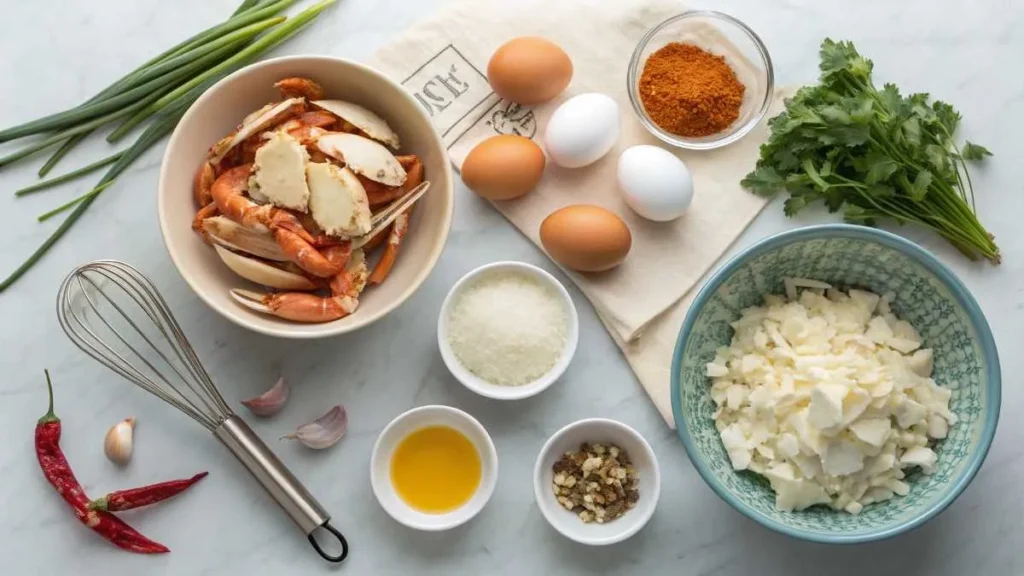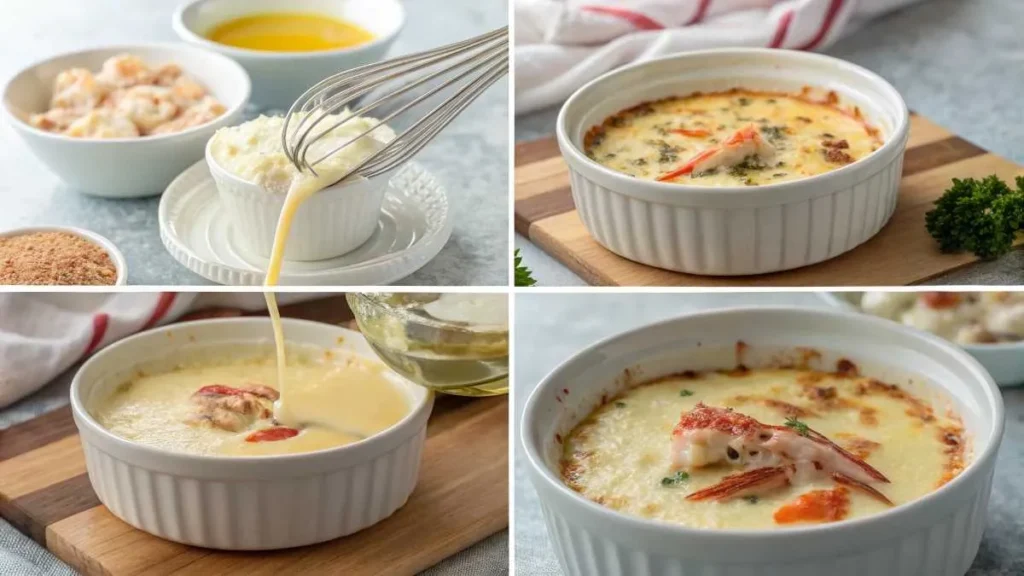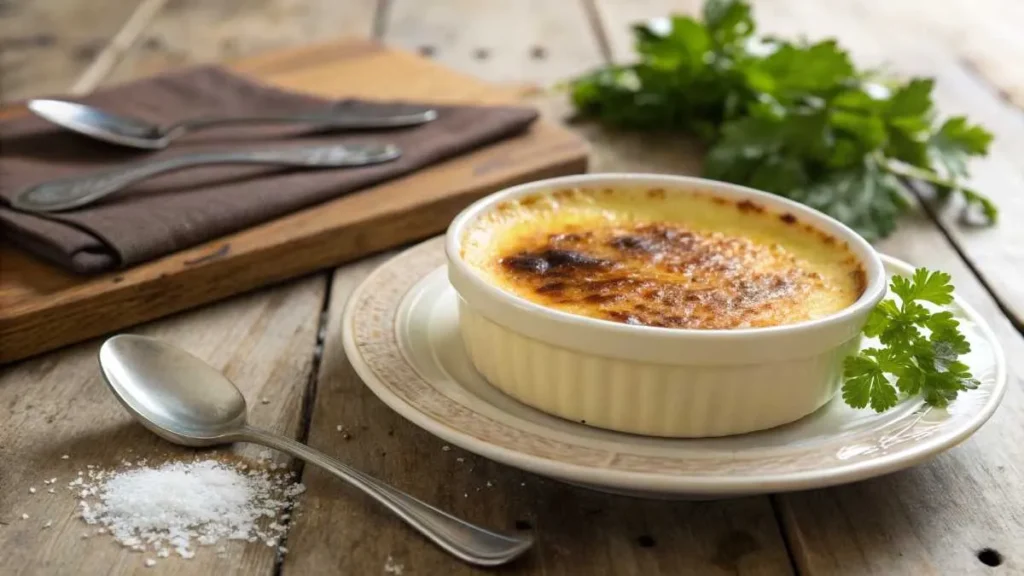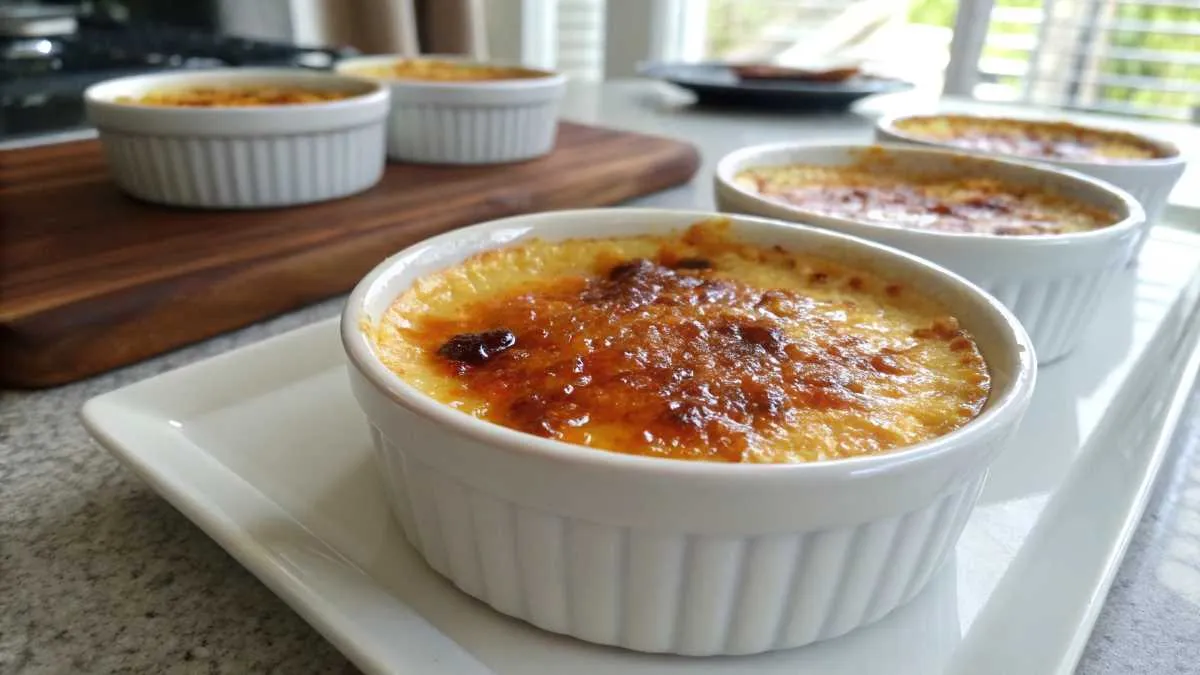When you think of crème brûlée, your mind probably jumps straight to the classic dessert—smooth custard with that irresistible caramelized sugar crust. But what if I told you there’s a savory version that’s equally luxurious, with rich crab meat at its heart? Yep, we’re talking about crab brulee—the ultimate blend of fancy and comforting. It’s the kind of dish that makes people stop mid-bite and go, “Whoa, what is this magic?”
Whether you’re whipping it up for a dinner party or just treating yourself (because why not?), this recipe will take your seafood game to the next level. So, grab your apron, and let’s get cooking!
Introduction to Crab Brulee Recipe
What is Crab Brulee?
So, what exactly is crab brulee? Picture this: a creamy custard base made with fresh crab meat, infused with bold seasonings, and topped with a perfectly caramelized layer of sugar—or sometimes cheese, for a savory kick. It’s like your favorite seafood dip got a glow-up and decided to dress up for a five-star dinner.
Honestly, this dish is a genius twist on the sweet crème brûlée, and it works surprisingly well. The sweetness of crab meat pairs beautifully with the richness of the custard, creating a unique flavor balance that’s both indulgent and unexpected.
Origin and History
While crème brûlée has French origins dating back to the 17th century, the savory crab version is more of a modern invention. It likely emerged in upscale seafood restaurants as chefs experimented with creative ways to serve crab. Now, it’s made its way into home kitchens, thanks to foodies like us who love trying something new.
Ingredients for Crab Brulee Recipe
Before we get into the nitty-gritty of making this decadent dish, let’s talk ingredients. Trust me, getting the right stuff makes all the difference.

Selecting the Best Crab Meat
First things first: the crab meat. You want something that’s fresh, flaky, and packed with flavor. If you’re lucky enough to live near the coast, grab some freshly steamed crab. For the rest of us, high-quality canned or frozen lump crab meat works just fine. Just make sure to remove any bits of shell—you don’t want any crunchy surprises.
Pro Tip: Go for lump or jumbo lump crab meat for the best texture. It’s worth the splurge for a recipe like this.
Essential Dairy Components
A silky custard needs a good balance of creaminess. For this recipe, you’ll need heavy cream and a touch of milk. Some folks like to throw in a bit of cream cheese for extra richness, but that’s optional. The key is to use full-fat dairy—it’s not the time for low-cal substitutes.
Seasonings and Flavorings
Here’s where you can get a little creative. While the crab itself is the star, the seasonings help bring everything together. You’ll need:
- Salt and pepper: The basics. Don’t skip ‘em.
- Old Bay seasoning: A must for seafood dishes—it’s like the magic dust of the crab world.
- Garlic and shallots: For a subtle, savory undertone.
- Lemon zest: Just a hint to brighten up the dish.
- Cayenne pepper: If you like a little heat, this is your jam.
Equipment Needed for Crab Brulee Recipe
You don’t need a professional chef’s kitchen to pull off crab brulee, but a few key tools will make the process smoother.
Kitchen Tools for Preparation
- Mixing bowls: For whipping up the custard and blending ingredients.
- Whisk: To get that custard silky smooth.
- Measuring cups and spoons: Because eyeballing doesn’t always work with custards.
Baking and Serving Essentials
- Ramekins: These are non-negotiable. Small, oven-safe dishes are perfect for portioning the custard and ensuring even cooking.
- Baking dish: To hold the ramekins in a water bath (more on that later).
- Kitchen torch: For caramelizing the top like a pro. If you don’t have one, the broiler works in a pinch.
Block Quote: “Ramekins are the MVPs of this recipe. Not only do they make serving easy, but they also ensure that each bite is perfectly baked.”
Step-by-Step Crab Brulee Recipe
Ready to get started? Here’s how to make crab brulee from scratch, step by step. Trust me, it’s easier than it sounds.

Preparing the Crab Meat
Start by gently picking through your crab meat to remove any stray shells or cartilage. Once it’s clean, give it a light toss with a pinch of salt and a dash of Old Bay seasoning. This pre-seasoning step helps the crab flavor stand out in the custard.
Creating the Custard Base
Here’s where the magic happens:
- In a medium saucepan, warm the heavy cream and milk over low heat. You want it warm but not boiling.
- In a separate bowl, whisk together the egg yolks, garlic, shallots, lemon zest, and a pinch of cayenne. Slowly pour the warm cream into the egg mixture while whisking constantly. (This process is called tempering, and it keeps the eggs from scrambling.)
Pro Tip: Take your time with tempering. Rushing this step is a one-way ticket to scrambled eggs.
Assembling the Dish
- Divide the crab meat evenly among your ramekins, spreading it out in a single layer.
- Pour the custard mixture over the crab until it’s just about ¾ full. Give each ramekin a little jiggle to let the custard settle.
Baking Techniques
Baking custards can be tricky, but a water bath makes it foolproof. Place the ramekins in a deep baking dish, then pour hot water into the dish until it reaches halfway up the sides of the ramekins. This keeps the custard cooking evenly and prevents it from curdling.
- Bake at 325°F (163°C) for 30–40 minutes, or until the custard is set but still slightly jiggly in the center.
Chilling and Setting
Once the ramekins have cooled to room temperature, cover them with plastic wrap and pop them in the fridge for at least 2 hours. This step lets the flavors meld and the custard firm up.
Caramelizing the Top
Finally, the fun part! Sprinkle a thin, even layer of sugar (or grated Parmesan, if you prefer savory) over each custard. Use a kitchen torch to melt and caramelize the topping until it’s golden and bubbly.
Block Quote: “There’s nothing more satisfying than that first crack of caramelized sugar. It’s like breaking into a treasure chest of flavor.”
Tips for Perfect Crab Brulee Recipe
Making crab brulee might seem like a culinary feat, but with a few insider tips, you can make it flawless every time. Let’s ensure every ramekin turns out creamy, flavorful, and picture-perfect.
Achieving the Ideal Texture
The texture of crab brulee should be silky, not rubbery. Here’s how to make sure your custard has the perfect consistency:
- Low and slow cooking: Always bake the custard at a low temperature (325°F) to avoid overcooking.
- Water bath is essential: This step ensures even heat distribution, which is key to a smooth custard.
- Don’t skip straining: Before pouring the custard into the ramekins, strain it through a fine mesh sieve. This removes any egg solids or lumps, guaranteeing a velvety base.
Flavor Enhancement Strategies
Balancing flavors is crucial for a dish like this. Here’s what you can do:
- Use fresh herbs like parsley or chives for garnish—they add a pop of freshness.
- Consider adding a splash of white wine or sherry to the custard for depth.
- Experiment with cheeses: A sprinkle of Gruyère or Parmesan on top adds a savory twist that’s hard to resist.
Pro Tip: If you’re into experimenting with pairings, check out this fried cabbage and sausage recipe for a hearty side dish that complements crab brulee beautifully.
Common Problems and Solutions
Even seasoned cooks hit a few snags. Here’s how to troubleshoot the most common crab brulee issues.
Custard Not Setting Properly
If your custard turns out runny, the most likely culprit is undercooking.
- Solution: Extend the baking time in 5-minute intervals and check for the perfect jiggle in the center.
Another cause could be improper proportions of cream to eggs. Stick closely to the recipe for the best results.
Uneven Caramelization
Sometimes the caramelized top doesn’t come out evenly browned.
- Solution: Hold the kitchen torch a few inches above the surface and move it in circular motions for even heat.
If you’re using the broiler, place the ramekins on the top rack and keep an eye on them—it only takes seconds to go from golden to burnt.
Crab Flavor Overpowering
If the crab flavor feels too strong, it might be the quality of the meat.
- Solution: Opt for lump or jumbo lump crab meat, which has a sweeter, more delicate flavor.
A squeeze of fresh lemon juice or a pinch of nutmeg in the custard can also help balance the richness.
Variations on the Classic Crab Brulee Recipe
Feeling adventurous? There are plenty of ways to customize your crab brulee to suit your taste buds.
Spicy Crab Brulee
For a spicy kick, add a dash of Sriracha or chopped jalapeños to the custard. The heat pairs surprisingly well with the creamy base. If you love this twist, you might also enjoy this strawberry banana pudding as a refreshing dessert afterward.
Herb-Infused Versions
Infuse your cream with fresh herbs like thyme, dill, or tarragon before adding it to the custard mixture. It’s a subtle way to layer in more flavor.
Lobster or Shrimp Alternatives
Not a crab fan? Swap it out for cooked lobster or shrimp for an equally indulgent version. Just make sure to adjust the seasoning to complement the seafood.
Serving and Presentation Ideas
Presentation matters, especially for a show-stopping dish like crab brulee. Here’s how to make it look as good as it tastes:

Garnishing Techniques
A simple garnish can elevate the dish without much effort. Try:
- Fresh herbs (like parsley, chives, or microgreens).
- A sprinkle of smoked paprika for color and a hint of spice.
- Lemon zest for a touch of brightness.
Suggested Placement of External Link: You can link to your Facebook profile here, inviting readers to share their results or variations. For example: “We’d love to see your creations! Share your photos and tips on our Facebook page.”
Pairing Suggestions
Serve crab brulee as a rich appetizer or a decadent main course. Pair it with a crisp white wine (like Sauvignon Blanc) or a light salad with citrus vinaigrette for balance. If you’re planning a dinner party, consider finishing the meal with this healthy apple crumble for a crowd-pleasing dessert.
Nutritional Information and Dietary Considerations
While crab brulee isn’t exactly a light dish, it’s rich in protein and omega-3s, thanks to the crab meat. If you’re looking to tweak the recipe for specific diets:
- Keto: Replace the sugar topping with grated Parmesan.
- Gluten-Free: This recipe is naturally gluten-free, so no changes needed!
- Low-Cal: Substitute half the heavy cream with whole milk for a lighter version.
Frequently Asked Questions
The secret lies in the balance: silky smooth custard and a perfectly caramelized sugar crust.
Crème brûlée is a baked custard topped with caramelized sugar, while custard can be baked or stirred and lacks the crunchy topping.
Use oven-safe dishes like small mason jars, ceramic bowls, or coffee mugs.
It translates to “burnt cream,” referring to the caramelized sugar top.
Conclusion:
Crab brulee is more than just a dish—it’s a culinary experience that combines elegance with comfort. With its creamy custard, delicate crab meat, and caramelized topping, it’s sure to impress at any table. Whether you’re preparing it for a special occasion or a cozy night at home, this recipe is both indulgent and approachable. So, gather your ingredients, embrace the process, and enjoy every bite of this unforgettable creation.
Got questions or creative twists of your own? Share them on our Facebook page—we’d love to see how you’re making this dish your own!
